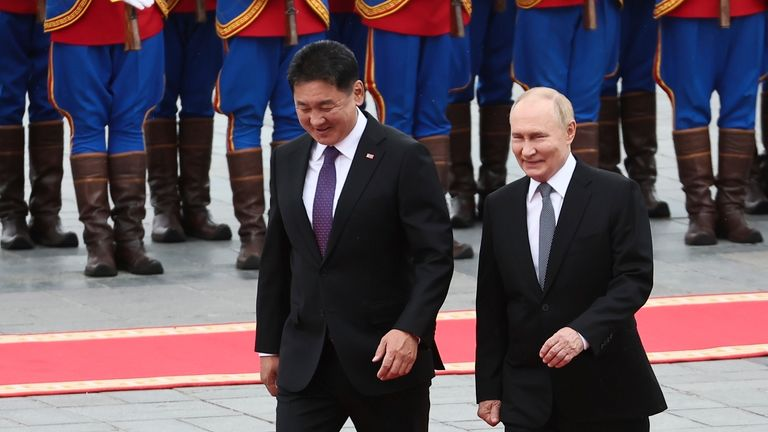Mongolia Welcomes Putin Amid ICC Warrant Controversy
On Tuesday, Russian President Vladimir Putin received a lavish red-carpet welcome in Mongolia’s capital, Ulaanbaatar, during a state visit that has sparked significant controversy. Despite an International Criminal Court (ICC) warrant for his arrest, Mongolia’s decision not to detain him has drawn sharp criticism from Ukraine, which sees it as a severe blow to international justice.
As Putin stepped out of his limousine, he was greeted by Mongolian President Ukhnaagiin Khurelsukh and a ceremonial guard in traditional attire. The moment was marked by Putin leaning down to kiss a young girl who presented him with flowers, a gesture steeped in diplomatic protocol.
The ICC issued an arrest warrant for Putin in March 2023, accusing him of war crimes related to the abduction of Ukrainian children. According to international law, Mongolia, as an ICC member state, is obliged to detain Putin and hand him over if he enters its territory. However, the Mongolian government has opted to forgo this obligation, a move that Ukrainian officials have heavily criticized. Heorhiy Tykhyi, Ukraine’s Foreign Ministry spokesperson, condemned Mongolia’s inaction as a severe setback for global criminal justice.
Since the warrant was issued, this visit was Putin’s first time to an ICC member state. Before the trip, Ukraine and the European Union had urged Mongolia to fulfill its legal duties. However, Mongolia faces a complex situation, balancing its historical ties with Russia and its modern relationships with other global powers. The country, transitioning from a Soviet-aligned state to a democratic nation with diverse international partnerships, remains economically dependent on Russia and China, complicating its position.
During his visit, Putin and Khurelsukh signed agreements to advance infrastructure projects, including upgrades to a power plant and studies for a new hydroelectric project. They also discussed improvements to their rail system. Putin invited Khurelsukh to attend a BRICS summit in Kazan, Russia, later this year—a gesture reflecting ongoing diplomatic and economic ties.
The visit was not without controversy. A small group of protesters in Ulaanbaatar attempted to voice their opposition by displaying Ukrainian flags and anti-Putin banners, but police swiftly detained them.
In a grim parallel to the diplomatic spectacle, Russian forces launched a deadly attack on a Ukrainian military facility and hospital in Poltava, killing at least 47 people and injuring over 200. This escalation underscores the ongoing and severe impact of the conflict in Ukraine.
While showcasing Mongolia’s historical ties with Russia, the visit has also sparked debates about the country’s role on the global stage. Critics, including some Russians living abroad and former Human Rights Watch director Kenneth Roth, argue that the trip highlights a troubling disregard for international legal norms. In contrast, Kremlin spokesman Dmitry Peskov downplayed these concerns, emphasizing the visit’s focus on strengthening bilateral relations.
Mongolia’s decision has also evoked mixed reactions domestically. Some view it as a necessary move to maintain strategic alliances, while others, like Uyanga Tsoggerel, see it as a betrayal of democratic values and international obligations.
As Putin continues his diplomatic efforts globally, this visit to Mongolia highlights the complex interplay between international law, diplomacy, and geopolitical strategy.

